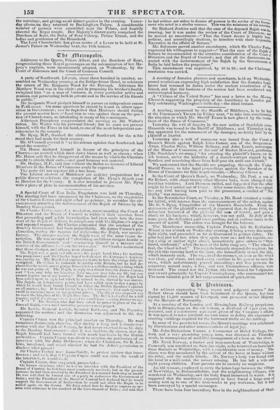A Special Court of East India Proprietors was held on
Thursday. The meeting had been summoned by the Chairman, on the requisition of Sir Charles Forbes and eight other proprietors, to consider the cir- cumstaoces attending the dethronement of the Rajah of Sattara by the Bombay Govermuent.
Sir Charles r orbe moved a resolution, recommending the Court of Directors and the Board of Contrid to withhold their sanction from that proceeding mid! a fair ins estigation had teen made into the con- duct of the Rejah of Samul, in complience with his Highness's urgent and repeated request. Sir Charles contended that the conduct of the Bombay Goverumeat had been uojustifiahle. Sir James Carnac's pro- clamation, stating the reasons for dethroning the Rajah, was unsatis- factory. The charges dettinst the Rajah were of the most vague de- scription. lie was accused of " cherishing ambitious designs hostile to the British Government," and " conducting himself in a manner sub- versive of the alliance leo weeu the tie() St Cs." Sir Charles maintained that these charges, and others, were absurd— The IZajall was a good and able man ; hi people loved him ; his territory VMS prosperous ; and Sir Charles hoped to t ;t11 that the Company's territory was equally so. The h,a1 expressed a desire to have the charge fully in- vestigated. He wished te Isaintain friendship with Britain, but he had de- clared that he would soouer phin;:e lihnsef into a well than confess a thing which he was not guilty of. The IZajah, r,ply to it threat from Sir James Carnam said " You may take my idu!,,loni from use, you may take my u k, but you cannot deprive MC of bmionr." The memorandum which the Rajah had been called rival but c. hid, he refused to dm showed lie was sincere. The Rajah, in it.depet.t■ci.t p:inee, had Lcu called ni:on to sign a paper by which lie w,uld have bound Iiimself to fauw the British Resident's opinion on all mat tete, &c. It would leudly he too ;ale to cent:, its: that such tyranny could be exercised upon an hul..penhilt prince. The ul.j, it 'utts clear—it was
to wrest the kin;dom of the filial lam. The had called for a full inquiry, and if l %,,.c provvil he ‘rouhl have further to say.
* * * Ills hroilvr, who had been raisid to power iu place of the de- throned Rajah, a mod unworthy :=0 PVC1;--a niere-pappet.
Mr. Lewis, General Lodick, General hohita on, and :Irv. Poynder, supported the motion ; and the discussion was adjourned to the day following.
Captain Cogan was the principal speaker on Thursday. lie read numerous documents, showing, that during a long and ietimate con- nexion with the Rajah of S.:ttora, he had never swerved from his duty to the Bombay Government : also it was ineident::Ily shown, that the Rajah himself had been treated with much harsheess by the British authorities. Captain coeall was abeur to mention the particulars of an interview with Sir John 11(04mm:0; When the Chairman, sir le, Jen- kins, interfered, and asked whether he had Sir John's permission to disclose what passad Sir Charles Forbes rose immediately, to protest against that inter- ference ; and said, that if Ceptaiu Cogan could not state the result of the interview, he would do it.
Captain Cogan, thus supported, proceoled- On former occasions, when he Ical an interview with the President of the Board of Control, he had been most courteously received; but in the present instance he had been received by the President in a manner bordering on insult. lie was told that be limited ante of a party to embarrass the Government of India ; and the President of the Board of Control had declared that he would support the Government of India—that he would not ;Wow the Rajah to be seated again on the throne. Sir John asked how be dared to express an opi- nion with reference to the conduct of the Government of India ; nod said that
he lied written out orders to dismiss all persons in the service of the Goma. ment who acted in a similar manner. This was, the substance ot'hia interview, Sir Richard Jenkins said that the case of the deposed Rajah was sit, tressing, but it was under the review of the Court of Directors; and he moved an amendment—" That the Court deems it .highly ;nem, pedient, and accordingly declines, to interfere with their responsible Executive in the affairs of Sattara."
Mr. Salomons moved another amendment, which Sir Charles Porkies expressed his willingness to support—" That the case of the Rajah of Sattara be recommended to the attentive consideration of the Court of Directors and the Board of Control ; and that all the documents eon. nected with the dethronement of the Rajah by the Government of India be laid before the proprietors."
This amendment was negatived, by 56 to 26; and the Chairman's resolution was carried.


























 Previous page
Previous page